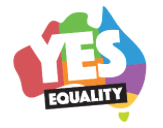How the marriage equality vote will affect visas for same-sex couples
The marriage equality debate is well under way in Australia as the country prepares for a postal plebiscite. The results of the questionnaire will inform a vote in parliament on the issue.
As well as being a social issue, marriage equality is a business one too. Many businesses have rallied behind the “yes” vote. A happy workforce, after all, is a productive one. And to remain competitive and able to attract the best talent from around the world, it makes sense to create a fair and respectful environment for everyone to live and work in.
From an immigration perspective, if the “yes” vote prevails it will affect Australia’s Prospective Marriage visa and those people who can apply for it. Currently, this visa is not open to the partner in a same-sex relationship with an Australian citizen or permanent resident – for the simple reason that Australia, as yet, does not grant marriage equality to same-sex couples.
Advance Australia Fair

This is in contrast to other Australian visas which are open to couples in a same-sex relationship. Take Australia’s partner visas, for example. Australia’s partner visas – namely the subclass 309 / 100 for those applying outside of Australia or the subclass 820 / 801 for those applying in Australia – are for individuals who are married to or in a de facto relationship with an Australian citizen or permanent resident – and include partners in a same-sex relationship.
In the context of migration, Australia defines a de facto relationship as being one where the two individuals are not married to each other but have an exclusive relationship; are committed to sharing a genuine and ongoing relationship; and who live together or at least don’t live apart on a permanent basis. For migration purposes, couples must have been in a de facto relationship for at least 12 months before applying for a visa.
Same-sex de facto relationships are also recognized for partners applying as secondary applicants for a permanent visa, a business skills visa, a student visa or a general skilled migration visa. (As with all Australian visas, applicants must meet specified criteria, including strict health and character requirements).
Although same-sex de facto relationships are recognized by the Department of Immigration and Border Protection, the married status of a person who has a same-sex spouse is not. Even though more than 20 countries have passed laws to allow same-sex marriage, including the USA, Ireland, New Zealand, Canada and Great Britain, Australia’s immigration legislation does not recognise the married status of same-sex couples who tied the knot in any of these countries.
In Australia, if the “yes” vote prevails, that situation is likely change. It would likely mean same-sex couples who married overseas can present their marriage certificate as evidence of their relationship instead of meeting the de facto requirements.
The Australian Business Migration Group helps business, individuals and families with Australian visa and migration issues.

